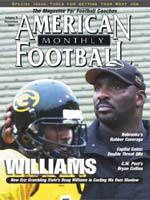AMERICAN FOOTBALL MONTHLY THE #1 RESOURCE FOR FOOTBALL COACHES
Article CategoriesAFM Magazine
|
Steppin\' OutGrambling State\'s Doug Williams casts his own shadowby: David Purdum © More from this issue Former coach and forever Grambling State legend Eddie Robinson doesnít come on campus as much these days. Maybe itís because, at 84-years wise, Coach Robinsonís sideline agility isnít what it used to be. Winning 408 football games will do that to you. Or maybe itís because heís satisfied, knowing that a budding superstar has filled his giant shoes, which were left behind upon college footballís all-time winningest coach retired in 1997. ďDoug is simply awesome,Ē said Robinson. ďIím not concerned about Doug. We (Grambling) got the coach we wanted and he is doing a terrific job.Ē Itís the 21st century, and the Southeastern Conference still hasnít had a black head football coach. Grambling State head coach Doug Williams knows it, and heís made sure....The full article can only be seen by subscribers. Subscribe today!
|
|
|||||||
| HOME |
MAGAZINE |
SUBSCRIBE | ONLINE COLUMNISTS | COACHING VIDEOS |
Copyright 2025, AmericanFootballMonthly.com
All Rights Reserved





